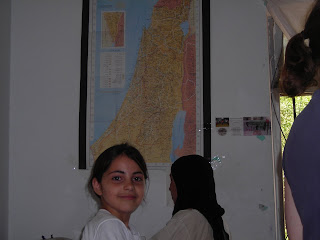

 I have started to prepare for leaving here. It is Tuesday morning, in another two dahys I will be leaving Abu Dis to spend two or three days in Israel proper as part of my 'alibi' cover story to tell officials at Tel Aviv airport who will want to know what I have been doing for the last month. They won't want to know that I have been in a town in the Palestinian territories. So I will have to post back to myself in London all 'incriminating' stuff such as friends' email addresses, telephone numbers and messages which I am going to delete off my mobile, anything in Arabic, photographs of course, which I am going to upload on to my email account and then delete off my camera. I hate and resent having to behave acting like a criminal. It just shows how much the Palestinian territories is not a state, has not been allowed to have the makings of a state, has no control of its own borders, who comes in and who comes out, even within its borders the Palestinian authority has very limited control.
I have started to prepare for leaving here. It is Tuesday morning, in another two dahys I will be leaving Abu Dis to spend two or three days in Israel proper as part of my 'alibi' cover story to tell officials at Tel Aviv airport who will want to know what I have been doing for the last month. They won't want to know that I have been in a town in the Palestinian territories. So I will have to post back to myself in London all 'incriminating' stuff such as friends' email addresses, telephone numbers and messages which I am going to delete off my mobile, anything in Arabic, photographs of course, which I am going to upload on to my email account and then delete off my camera. I hate and resent having to behave acting like a criminal. It just shows how much the Palestinian territories is not a state, has not been allowed to have the makings of a state, has no control of its own borders, who comes in and who comes out, even within its borders the Palestinian authority has very limited control.I am sitting in the gardens of the university, we take the students from the summer camp up here sometimes, someties I come here by myself. There are shaded open buildings, grass sometimes fountains, and in sight of everything the separation wall. I can sit here drinking orange juice, listening to the beautiful Lebanese and Palestinian music coming from the speakers and think about the people I have met, what they have told me, and how much hope for the future there is.
Undoubedly the situation here is obscene and unjust: the wall, the pass system, the checkpoints, the settlements, the 'police' (army) presence with its raids, and brutalities, the prevention of people from coming in or leaving, the running down of services and essentials like the water-supply, has made this territory into a huge prison camp. Apartheid is not an inaccurate word for what this is, much as I disliked and feared the use of the term before I came here. The people I have met have developed a sometimes stoical, sometimes cynical sometimes good-humoured acceptance of the daily humiliations and difficulties of their lives, and still manage to have a good life in many ways - the wedding parties are amazing, people are generous and gracious and more friendly than anywhere else that I have known. They are crying out for their stories to be known, twinning organisations like the Camden Abu Dis Friendship Association are leading the way in publicising what is going on here and supporting the community.
I am amazed how little hostility I have had from people who know about my being Jewish. Given that the only exposure to Jews most people here have had has been to soldiers and settlers - both usually very negatve experiences - it is sign of how generous people are here that they are open and accepting of anyone who are open to them. Sarah my flatmate went to a Bedouin refugee camp near here a few weeks ago, which was in sight of two settlements Ma'ale Adumim and Kidar. One of the women there said, 'I have Israeli friends, they come to visit me sometimes. There are good and bad people in any group'. I had several people say similar things to me. A trader in Nablus, when I told him how friendly I thought Palestinians were, replied to me that there were good and bad among all people.
I hear people say that there will never be any accommodation with Israel, ('We are too different, our cultures are too different'). Palestinian maps of the region completely ignore the reality of Israeli towns and cities, just as Israeli maps completely ignore the reality of the Palestinians. But it is in the music here that I often find the most hope. The Lebanese and Palestinian music that floods over these gardens, the love songs that are so emotional and heart-rending, have absorbed styles from all over the world - jazz, Turkish, folk, romantic European piano riffs from the nineteenth century. There is an openess and inclusiveness to this culture despite all the injustices, and suffering which makes me optimistic for the future.
No comments:
Post a Comment